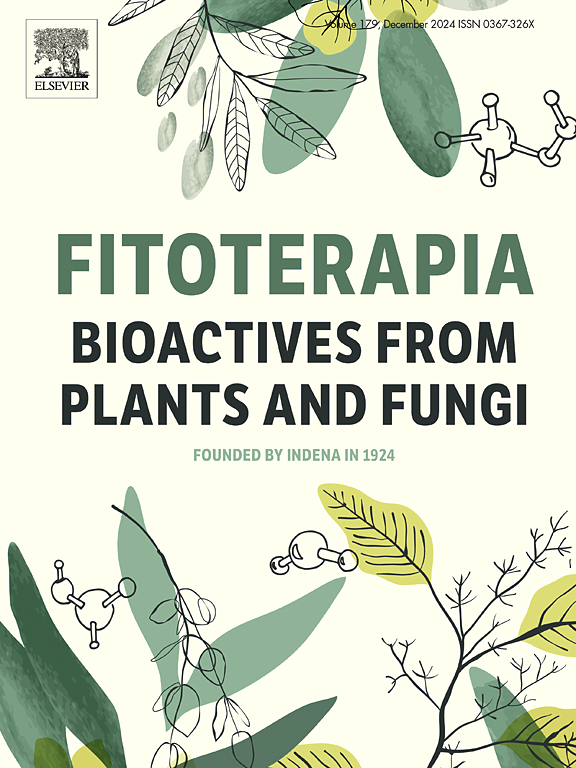芒果(Mangifera indica L.)树皮中的抗炎二苯甲酮
IF 2.5
3区 医学
Q3 CHEMISTRY, MEDICINAL
引用次数: 0
摘要
芒果(Mangifera indica L.),俗称“水果之王”,在南亚已有数千年的种植历史。它的树皮是天然植物化学物质的丰富来源,如二苯甲酮、酚酸和固醇。同时,芒果也被广泛用作治疗炎症相关疾病的中药。本研究对芒果树皮中的植物化学物质进行了研究,分离纯化了22个二苯甲酮类化合物,其中8个化合物未被描述。用综合光谱法对它们的结构进行了分析。在脂多糖(LPS)刺激的BV-2小胶质细胞中评价了分离的二苯甲酮类化合物的抗神经炎作用。二苯甲酮对一氧化氮(NO)、白细胞介素6和白细胞介素1β的产生有明显的抑制作用。其中化合物16的活性最强(IC50 = 12.93±0.67 μM),优于米诺环素(IC50 = 34.73±4.06 μM)。进一步的机制研究表明,化合物19和22可以浓度依赖性地抑制iNOS、COX-2、IL-1β、IL-6和CCL2,同时抑制NF-κB核易位,这表明它们参与了NF-κB途径。这些结果提示,芒果皮中的二苯甲酮类化合物可作为一种健康有益剂用于神经退行性疾病的治疗。本文章由计算机程序翻译,如有差异,请以英文原文为准。

Anti-inflammatory benzophenones from the barks of mango (Mangifera indica L.)
Mango (Mangifera indica L.), commonly known as the “king of fruits”, has been cultivated in South Asia for thousands of years. Its barks are a rich source of naturally occurring phytochemicals, such as benzophenones, phenolic acids, and sterols. Meanwhile, mango has been commonly used as a traditional Chinese medicine for inflammation-related diseases. In this study, phytochemicals in the barks of mango have been carried out and twenty-two benzophenones, including eight undescribed compounds were isolated and purified. Their structures were elucidated through comprehensive spectroscopic method. Anti-neuroinflammatory effects of the isolated benzophenones were evaluated in BV-2 microglia cells stimulated by lipopolysaccharide (LPS). The benzophenones exhibited significant inhibitive effects on the production of nitric oxide (NO), IL-6 and IL-1β. Notably, compound 16 exhibited the strongest activity (IC50 = 12.93 ± 0.67 μM), outperforming minocycline (IC50 = 34.73 ± 4.06 μM). Further mechanistic studies on compounds 19 and 22 revealed they concentration-dependently suppressed of iNOS, COX-2, IL-1β, IL-6, and CCL2, alongside inhibition of NF-κB nuclear translocation, which suggested NF-κB pathway involvement. These results suggest that the benzophenones from mango barks might be explored as a healthy benefit agent to be used for neurodegenerative diseases.
求助全文
通过发布文献求助,成功后即可免费获取论文全文。
去求助
来源期刊

Fitoterapia
医学-药学
CiteScore
5.80
自引率
2.90%
发文量
198
审稿时长
1.5 months
期刊介绍:
Fitoterapia is a Journal dedicated to medicinal plants and to bioactive natural products of plant origin. It publishes original contributions in seven major areas:
1. Characterization of active ingredients of medicinal plants
2. Development of standardization method for bioactive plant extracts and natural products
3. Identification of bioactivity in plant extracts
4. Identification of targets and mechanism of activity of plant extracts
5. Production and genomic characterization of medicinal plants biomass
6. Chemistry and biochemistry of bioactive natural products of plant origin
7. Critical reviews of the historical, clinical and legal status of medicinal plants, and accounts on topical issues.
 求助内容:
求助内容: 应助结果提醒方式:
应助结果提醒方式:


